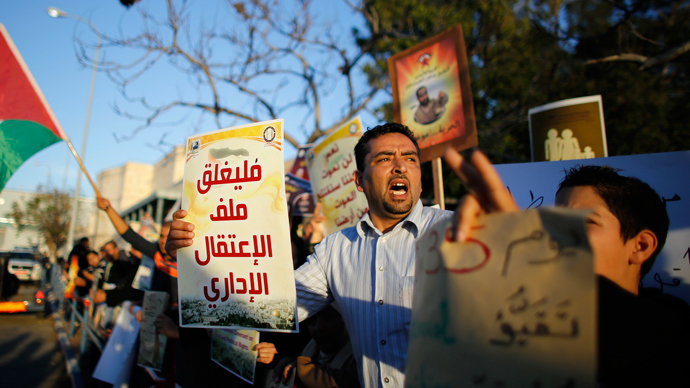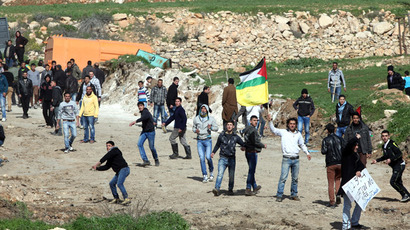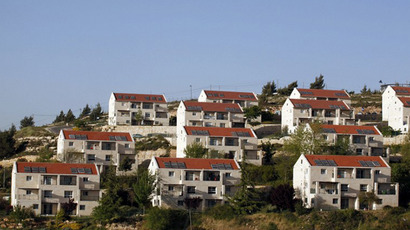Israeli govt gets crossfire criticism over Palestinian prisoner release

Israel has issued the list of 26 Palestinian prisoners to be released ahead of peace talks with the Palestinian Authority due to start Wednesday. The issue sparked protests from both Israelis and among the prisoners themselves.
While the US-sponsored Mid-East peace talks are approaching, tensions are riding high in both Israeli and Palestinian societies as resuming the dialogue frozen five years ago implies painful steps.
Israel, which promised to release 104 Palestinian prisoners as part of the agreement to restart the talks, has published the list consisting of 26 inmates who will be the first to see freedom. Their release was approved by a special ministerial panel on Sunday.
Twenty-one persons in the group were convicted for killing Israeli civilians, servicemen and Palestinian collaborators, while the remaining five were involved in attempted murder or kidnapping.
Practically all prisoners on the list were sentenced before the Oslo Accords of 1993, having already spent two decades in prison, with one having been arrested in 1985, i.e. 28 years behind bars. Half were serving life sentences, while others had given release dates without the special deal. One was supposed to leave prison in six months’ time. One prisoner was arrested in 2001, making him a somewhat improper candidate for the release, since Palestinians demand pre-Oslo inmates be released first.
Fourteen of the 26 prisoners are to be deported to Gaza Strip, while the remaining 12 are to be sent to the West Bank.
Three Israeli ministers who selected the prisoners for release were Defense Minister Moshe Yaalon, Justice Minister Tzipi Livni and Science and Technology Minister Yaakov Peri.

Livni will meet the Palestinian Authority chief negotiator Saeb Erekat on Wednesday to kick off the peace talks.
The Israeli government allowed 48 hours between naming the prisoners and their release so the public could file objections with the Israeli High Court of Justice.
The release of 104 Palestinian prisoners was a pre-condition from the Palestinian side. According to the US-sponsored agreement they are to be released in four stages depending on the talks’ progress.
The publication of the list prompted an outcry in Israel.
“These are not political prisoners, they are terrorists and murderers who will be returning home to a hero’s welcome,” told Israeli Channel 2 TV Gila Molcho, a brother of Israeli lawyer Ian Feinberg, who was stabbed to death in a European aid office in Gaza City in 1993. “They will be celebrating the killers of our brothers and children.”
Meir Indor, the head of Israeli terror victim organization
Almagor, said this is “a day of celebration for the
Palestinian terror organizations, and a sad day for bereaved
families and for Israeli society.”
Some of the Palestinians to be released (as cited by Haaretz):
Salah Ahmed Ibrahim Mughdad, convicted to life sentence for murdered 70-year-old Israel Tenenbaum in the 1990's
Samir Abdel Na'anish, convicted to life sentence for murder of Israeli soldier Benyamin Meisner in Nablus in 1989
Mahmoud Bad Almagid Saulha and Fauza Ahmed Husseini Saulha from Nablus, convicted to life sentence for stabbing to death teenager Baruch Heizler at a bus station while they themselves were minors
Housing Minister Uri Ariel, a member of the ultranationalist
Jewish Home Party, also reacted harshly.
“Terrorists belong in prison,” Ariel said in a statement
on Monday. “The terrorists who are being released murdered
women and children, and it´s not clear to me how releasing
murderers can help peace.”
On Sunday Uri Ariel announced the construction of nearly 1,200 new apartments for Jewish settlements in East Jerusalem and the West Bank, prompting an angry reaction from Erekat, who said it was a deliberate attempt to scupper peace talks.
“If the Israeli government believes that every week they’re
going to cross a red line with settlement activity, if they go
with this behavior, what they’re advertising is the
unsustainability of the negotiations,” he said.
Palestinian prisoners defy liberation conditions
While Israelis believe their agreement to release 104
longest-term incarcerated Palestinian prisoners is a pure
goodwill gesture, the Palestinian prisoners themselves are
dissatisfied with the idea of being released in four groups in
direct dependence with the results of the upcoming
Israeli-Palestinian negotiations.
Their disappointment has been expressed in detail by Karim Younis, considered the longest-serving prisoner among Israeli Palestinians. He wrote a letter to President Mahmoud Abbas and the Palestinian leadership, expressing his personal discontent with prisoners been used as bargaining chips.
"We believed the position that you presented for years, according to which any renewal of the talks would necessitate the release of all veteran prisoners who were convicted before the Oslo Accords, without any division or postponement, and that the release would be in one stage,” Younis wrote as cited by Haaretz. “Unfortunately, today, after 20 years of fruitless negotiations that led to no practical results, we are sinking back into a labyrinth of Israeli evasiveness and geographical distinction.”

Younis also called into question the very possibility of release of next three groups of prisoners because “Israel is trying to set obstacles to any future agreement,” conditioning confirmation of the release dates with the results of negotiations.
The veteran prisoner, who has spent almost 30 years of his life behind bars, also criticized the Palestinian negotiating team which has been in talks with Israel for 20 years without achieving tangible results and questioned trustworthiness of the negotiators.
The families of Palestinian prisoners and advocacy groups are also dissatisfied with flexibility of the Palestinian Authority, though such organizations as the Palestinian Prisoner Society and the Palestinian Ministry of Prisoners’ Affairs traditionally support Palestinian authorities.
Kadoura Pharis, the president of Palestinian Prisoner Society,
who has received Younis' letter, told Haaretz that he supports
position of Karim Younis.
"I agree with every word. Karim has been following the negotiations from even before Oslo and is aware of all the details. All his reservations are correct and they necessitate answers from the leadership,” Pharis said.
Palestinian officials close to President Mahmoud Abbas have
already started consultations with activists and members of
prisoners’ families to manage the dissent.














